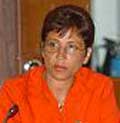

 During the debate on the State of the Nation Address, the SPPF MNA, Mrs Marie-Louise Potter, who attended further studies in Cuba during the one-party state, tried to justify the queues and fighting seen recently at the state trading company’s (SMB) supermarket with the following logic: “The reason why people queue to buy onions today is because they have plenty of money in their pocket. In the old days, because they did not have money, therefore they did not queue”.
During the debate on the State of the Nation Address, the SPPF MNA, Mrs Marie-Louise Potter, who attended further studies in Cuba during the one-party state, tried to justify the queues and fighting seen recently at the state trading company’s (SMB) supermarket with the following logic: “The reason why people queue to buy onions today is because they have plenty of money in their pocket. In the old days, because they did not have money, therefore they did not queue”.
Her arguments did not explain why, for example people would queue to collect water from a water tanker (bowser) during the drought season? Why would a mile long queue of Lorries develop outside the SMB warehouse whenever a consignment of timber arrived into the country after months living without any? Or at the silo at the New Port for cement. Why no one is seen queuing to breathe. The obvious explanation of the phenomenon, for anyone with a logical mind capable of making intelligent deductions, is the simple fact that, the bowser appears only when there is a shortage of water. The same applies to the long queues to buy timber or cement and all sorts of building materials. The common thread here is the word shortage of goods. The same explains why no one is queuing to catch a breath of air, which is freely available.
To take her logic to its natural conclusion, Mrs Potter is suggesting that perhaps President Michel and her Party has made a mistake in creating a society where people have money to spend. Is she suggesting that we should go back to the age when there was a shortage of money in the people’s pockets while shops were full of goods? But in the same breadth, Mrs Potter complains that there are plenty of expensive bicycles and cars on the market, why can’t the merchants import onions instead with that money?
Perhaps, unwittingly Mrs Potter has made an interesting observation about the nature of the economic system existing in
Her observation is not unique, however. During the Soviet era, to buy anything in the Soviet republics one needed to make long queues, sometimes lasting as long as half a day regardless of how much money one had in ones pocket. This applied even to alcohol, which was more readily available than anything else. This in reality was the common denominator of life under every communist (socialist) regime. The money to buy essential goods in countries under communism was not the currency we are accustomed to in